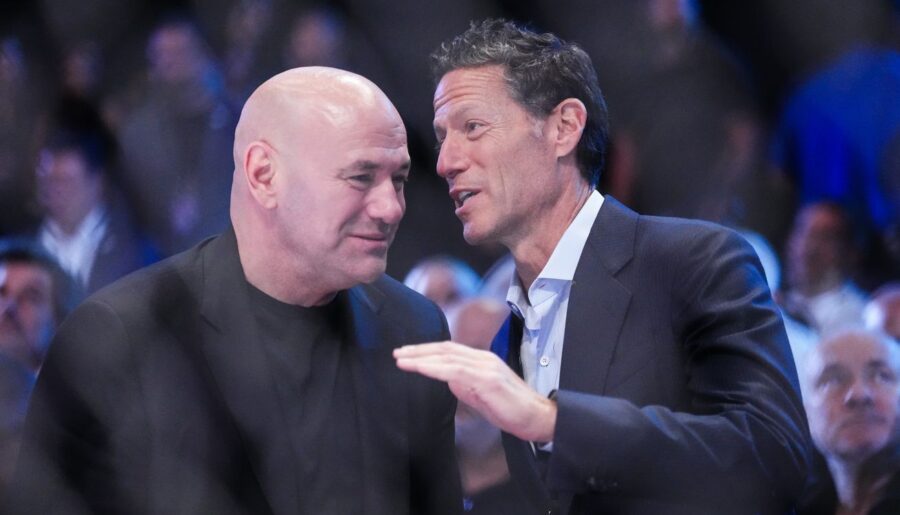Dana White and Mark Shapiro | Photo by Jeff Bottari/Zuffa LLC
The UFC is reportedly seeking at least $1 billion per year under terms of a new broadcast rights deal after the promotion’s current contract with ESPN expires at the end of 2025, but money isn’t the only driving factor behind whatever decision is made for the future.
That’s according to TKO Group Holdings president and chief operating officer Mark Shapiro, who addressed the ongoing negotiations for the UFC while also confirming that the company is currently engaged in conversations with numerous networks and streaming outlets interested in obtaining the broadcast rights package.
While the UFC didn’t strike a new deal with ESPN during an exclusive negotiating window that closed in April, Shapiro says they are still speaking with the Disney-owned network and branching out to talk to all interested parties.
“We’re not turning our backs on ESPN but we want to have multiple conversations and we want to make a smart, strategic decision that works best for our long term,” Shapiro said at the J.P. Morgan Global, Technology, Media and Communications conference on Tuesday. “The long term is not just the money.
“Of course the money’s important … of course it’s important to our shareholders. Most importantly but at the same time, what’s best for our brand? Who’s going to be our best marketing partner? Who’s going to continue to drive, what is still a nascent sport when you compare to leagues like NFL and Major League Baseball, who have been around for 100 years?”
A huge part of the UFC landing at ESPN was giving the fight promotion a level of legitimacy with events airing on the biggest sports network in the United States.
UFC stars frequently appear on ESPN shows and programming outside of the events that air on the network, which puts the promotion shoulder to shoulder with other major sports leagues like the NFL and NBA.
That said, Shapiro knows that there are numerous factors that play into whatever decision the UFC ultimately makes about the next broadcast rights deal.
“We’re in a window and we’re in multiple conversations,” Shapiro said. “Demand is strong. But we want to be thoughtful and strategic about who we sign up with. When we signed on the dotted line to go 10 years with Netflix [for WWE], you’re making a bet. They’re making a bet on you but you’re making an equal bet on them.
“It goes every which way as it relates to these UFC rights. Who’s going to be around? Who’s going to stick around? Who’s got a long-term strategy? Who’s going to be good in just the short term? Can you divide it up into multiple packages and have your cake and eat it, too? What’s the future of pay-per-view? Do you need pay-per-view? This is all stuff we’re analyzing and having conversations on.”
Shapiro also pointed out some advantages the UFC has over other sports properties, which includes the leadership structure where all decisions are made by a few key executives rather than 32 owners voting on proposals like in the NFL.
“There’s a lot of opportunity,” Shapiro said. “We’re year round, most aren’t. We’re global, most aren’t. We don’t have an owner’s committee, most do. We incentivize our fighters to be a part of the team, frankly, and we’re finding new ways for them to cash in beyond just winning in the octagon. The platforms recognize that. We’re young, we’re diverse, just a lot of upside.”
Another huge factor playing into the UFC’s favor is that the fight promotion is the only major sports rights package available for the next few years, which may incentivize a potential partner to pay more knowing that nothing else becomes available until 2028.
Specifically, Shapiro mentioned that ESPN is launching its own standalone streaming service later this year with a $29.99 starting price and the best way to ensure subscribers are paying and staying there is by offering premium content not available anywhere else.
The UFC used that model to help drive ESPN+ subscribers after previously inking the seven-year deal that gave the network exclusive rights to all programming including pay-per-view broadcasts.
“I have never seen the sports media rights environment this hot,” Shapiro said. “There will be periods where it cools off a little and as I mentioned, warm versus hot but it’s never going cold. That’s just not happening. Because it’s a proven winner. Once again, antidote to churn and at the same time a proven formula for subscriber acquisition.
“ESPN just announced this morning [the new streaming service], $29.99. So even though it will be a mirror of ESPN, it will obviously have a lot of bells and whistles and different camera angles and multi-cast and fantasy and sports betting integrated, it will be special but you need premium content to sell a [direct to consumer service] these days. You need premium content to keep subscribers on linear. So you’re feeding both beasts and I can tell you right now as it relates to premium content, demand is outstripping supply and particularly with regards to sports rights, there’s no major properties outside of the UFC and WWE [premium live events] that is up for renewal until 2028.”
Shapiro obviously feels the UFC is in an advantageous position right now, which is probably part of the reason why the company is engaging in so much due diligence and speaking to multiple potential partners before inking a new broadcast rights deal.
“We’re sitting in a very unique spot,” Shapiro said. “Beyond that, it’s going to stay strong because it’s a built in rooting interest, it’s live, it’s sharable, the highlights are snackable.”

